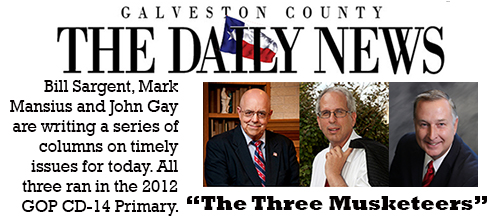|
This column was initially published in the Galveston County Daily News on September 22, 2014
It has been updated as of March 2025
When the three of us ran for Congress in 2012 most of the nine candidates agreed on the major issues. But we disagreed about term limits. John was in favor of having term limits, in part, because many who serve for long periods become more attached to their elected positions than to those who elected them. Bill and Mark, on the other hand, opposed term limits because they felt it restricts the voter’s right of free choice.
Let's face it, it is hard to beat an incumbent because he/she has the name recognition and often a large campaign war chest that makes it difficult for a challenger to compete for votes. That would argue for having term limits. At the same time if you have an elected official who is doing a good job and serves his/her constituents well, then why should he/she be forced out of office based solely upon length of service? But short of enacting term limits there is another option that will give the voting public the opportunity to express their opinion. It's called "None of the Above!"
Let us lay it out for you: What if for every race -- other than President/Vice President -- from Governor down to a local city councilman the option “None of the Above” is added to the bottom of each race on Primary Ballots? If “None of the Above” gets a majority of the votes in any race then it would force another election for that race in which any person appearing on the ballot in the first election would not be eligible to run. In order to avoid an endless chain of elections “None of the Above” would not be included as a choice in the subsequent Primary races. This novel idea makes sense and would most likely garner the support of the voting public. But for just that reason, it most likely will not be enacted -- because incumbents feel threatened by the idea.
Possible benefits:
- First, unlike term limits, "None of the Above" doesn’t take away the rights of the voters to make a choice about whether they want to keep their current elected official(s) in office. If the voters like him/her they can vote to reelect that person, if not, they could vote for “None of the Above;”
- Second, it might increase the attention elected officials pay to serving those who elected them -- something that some elected officials often lose sight of;
- Third, in races where challengers are not willing to file to run against incumbents because it is hard to compete against large campaign war chests and widespread name recognition, it could give voters the option of saying “We want to see more choices/alternatives;”
- Fourth, in races where there are multiple candidates, and the voters don’t like any of the choices, it would give the voters another opportunity to see some new and different choices;
- Fifth, it might also produce some fresh talent and new ideas on how to conduct the business of government; and
-
Finally, for absentee ballots it would help guard the integrity of the vote, making it virtually impossible for rogue election official from filling in an undervote (where no selection is made by the voter).
State Representative Valoree Swanson has introduced a bill in the 2025 legislative session that does much of what we have suggested. We think members should take a serious look at this measure, tailoring it if necessary to make it accomplish what we originally proposed back in 2014.
Bill and Mark
|



 Your Are Here: Home > News Columns > If Given the Chance Would you choose... None of the Above?
Your Are Here: Home > News Columns > If Given the Chance Would you choose... None of the Above?
